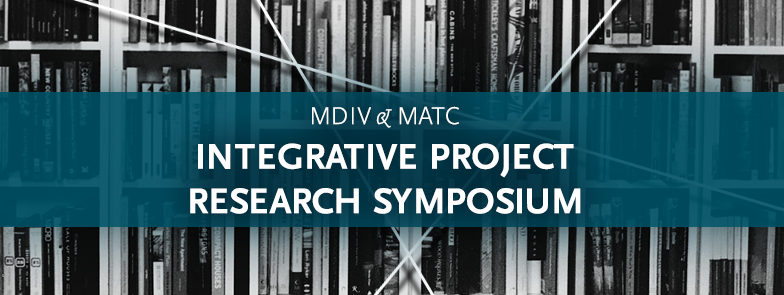The Integrative Project serves as a capstone for students in our theological programs as they look back on their training while discerning what it will look like for them to serve God and neighbor in their post-graduate contexts.
The Integrative Project is a capstone research project for students in our theology programs (Master of Divinity and Master of Arts in Theology & Culture) and is completed in their final year of the program. Students work with a faculty advisor to form a project that integrates the student’s passions and calling with the student’s unique embodiment of text, soul, and culture. Students draw from the fullness of their experience at The Seattle School and a robust research methodology to create a major project or paper.
The presentations below synthesize the project thesis along with the student’s experience and research in creating their final project. Final drafts of each Integrative Project are available in The Seattle School’s library.
When you watch these presentations, said Dr. Dwight Friesen, Associate Professor of Practical Theology, you are “bearing witness to the student’s best work to date—to what God is doing in them and through them.”
We will be sharing recordings of this year’s Integrative Project presentations over the next week.
View session two »
View session three »
View session four »
View session five »
View session six »
Learn more about our unique theology programs »
“The Hopes and Fears of All the Years,” Gary Hansen, MATC: Global & Social Partnership
Abstract
“The word became flesh and blood and moved into the neighborhood.” – John 1:14 (The Message)
Have you ever been admonished to “Keep Christ in Christmas?” Perhaps you’ve been forcefully reminded that “Jesus is the Reason for the Season.” Western Christians are often challenged to celebrate “The True Meaning of Christmas” in a way that doesn’t focus on secular symbols, but rather on Joseph and Mary, shepherds and angels, wisemen, and of course, the Baby Jesus. As long as this story is kept in mind, Christ remains in Christmas, and one is free to join in a sanctified spending of hundreds of billions of dollars during December, feasting extravagantly on decorations, gifts, and food with little thought given to participating in God’s redemptive mission in the world.
But how meaningful is our engagement with the incarnation story? If our wor- ship shapes our habits and actions, it begs the question: what sort of anemic re- telling of Christmas have we been proclaiming in our churches that has brought forth such a shallow remembering of the incarnation of God on behalf of the world? The hopeful, fearful anticipation of Emmanuel – God with us – has been reduced to overhyped cozy feelings and a voracious greed—for Christ’s sake.
I am inviting a return to the Advent and Christmas narratives with the goal of drawing the Church back toward becoming flesh and blood, toward moving into the neighborhood as representatives of the incarnate God. This project is an exploration of New Testament passages revealing themes of longing, fear, peace, humility, incarnation, and light overcoming darkness. My work proposes a curriculum that reexamines the symbols and practices of our Nativity celebration, leading the church to a celebration of the season that proclaims God’s incarnational love to their communities.
“From Cappadocia to California: A Theatrical Application for the Christian Journey,” Jay Briggs, MATC: Theology, Imagination, & the Arts
Abstract
In his book, To Change the World: The Irony, Tragedy, and Possibility of Christianity in the Late Modern World, James Davison Hunter proposes that the proper Christian stance in regard to culture in the 21st century should be a posture of “faithful presence.” In a world where the Christian voice is no longer the dominant one, faithful presence helps the Christian to contextualize participation in cultural institutions as integral to faith rather than an appendage to it.
This paper proposes a framework for understanding theatre practice from a theological perspective that fits with Hunter’s notion of faithful presence. It accomplishes this task by first articulating the Christian life as a symbiotic relationship between contemplation and action. This case will be made by way of a conversation with and between classical and contemporary theology, more specifically the writings of Gregory of Nyssa and Kathryn Tanner. Through Gregory we will explore the notion of epectasis, or perpetual progress, as the shape of the Christian life. Then, to complement Gregory’s vision, we will turn to Tanner’s Christian ethics for an understanding of how this ever-growing assumption by Christ through the Spirit can manifest itself in contemporary human relationships.
Finally, I will use Cornerstone Theater Company, a Los Angeles based community-engaged theatre company, as a case study in applying these theological principles to a theatrical context. In all this it is my chief contention that the theatrical endeavor, even in the secular realm, can utilize a methodology compatible to the gift-giving action articulated in Tanner’s model of social relationships. Thus, theatre-making can serve as a viable activity to complement Christian contemplation.
The next group of Integrative Project Presentations from the Research Symposium will be posted Wednesday, July 16.

